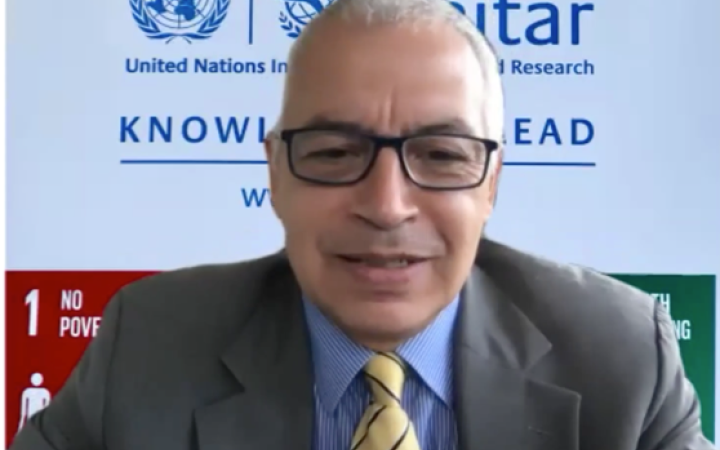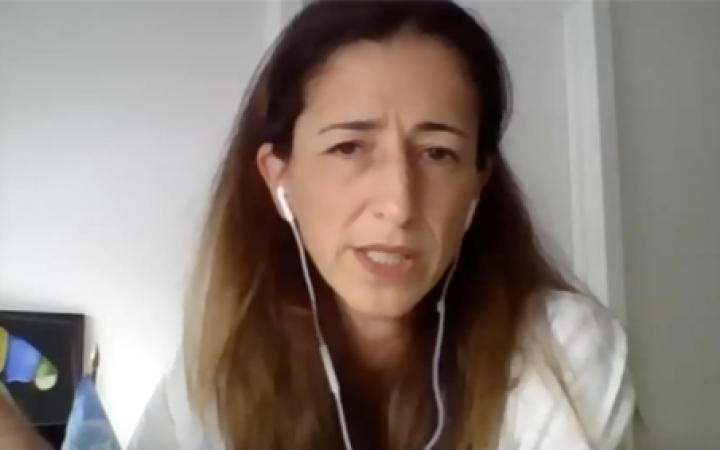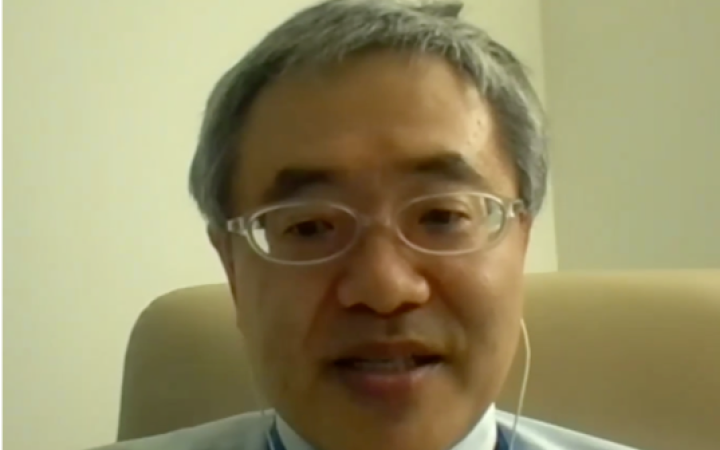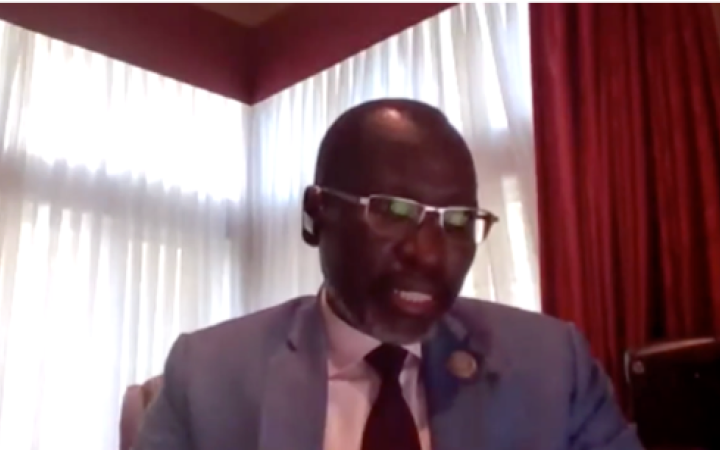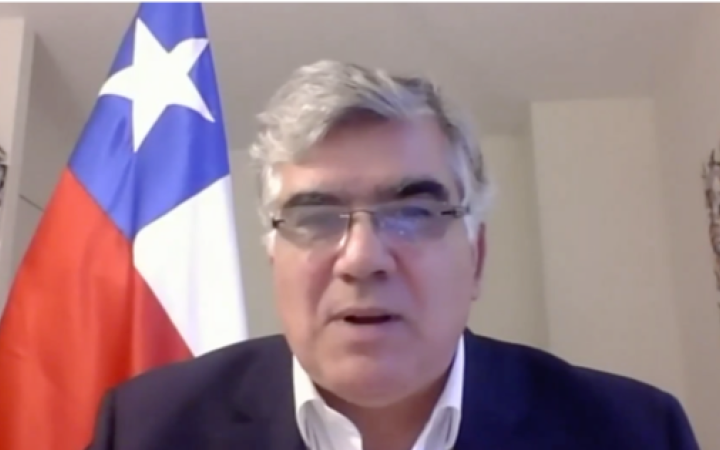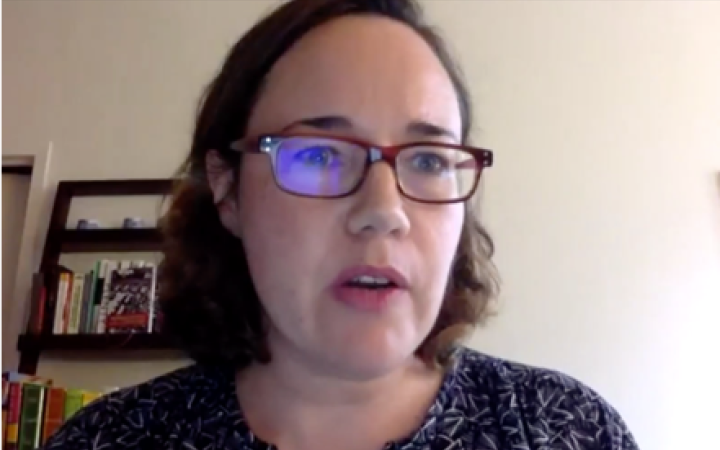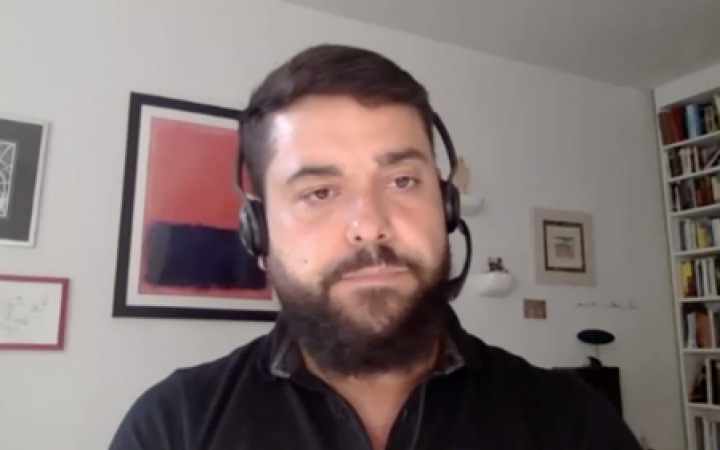UNITAR started the second day of training by debuting its new video on the process of drafting UN resolutions , and introduced its latest publication Guidelines for United Nations Resolutions—a great resource for preparing for the 75th UNGA. After the video, the head of UNITAR New York office, Mr. Marco Suazo, warmly welcomed the participants and introduced the first speaker of the day, Ms. Blanca Montejo, the Senior Political Affairs Officer of the Security Council Practices and Charter Research Branch from the Security Affairs Division (SCAD).
Ms. Blanca Montejo started the second day with her session titled "Relationship of the Security Council to the General Assembly." She firstly clarified the differences between the General Assembly (GA) and the Security Council by introducing their responsibilities and areas of work. Then, she laid out the areas of collaborations between the two and provided an overlook of the Security Council's seats allocation for this year. To further explain the scope of work of the GA and the Security Council, Ms. Montejo mentioned that on specific situations such as the conflict in the Syrian Arab Republic or the Democratic People's Republic of Korea, the GA will propose recommendations to the Security Council. The GA emphasized that it was crucial for the Member States to not only stay in contact, but to enhance their communications with the General Assembly (GA) during this unprecedented time.
Ms. Montejo then answered some questions from the participants by the end of her session. She further explained topics such as the voting process in the Security Council (the number of members, the relationships between the SC and the Human Right Council, and some other questions related to the impact of COVID-19 to the work of the Council.
Mr. Kenji Nakano, the Chief of the General Assembly Affairs Branch continued with his session - an introduction to the UN Elections, Negotiation and Decision Making in the General Assembly. Mr. Kenji Nakano gave an overview of the 75th Session of the GA, providing pertinent information on how the elections are held. He also shared reasons for the election of the President of the General Assembly three months prior to the start of the session, citing special historical circumstances that have impacted electing presidents such as the tragic events of September 11, 2001.
The last session in the morning was on the Work of the Third Committee (Social, Humanitarian &Cultural). Presented by H.E. Ms. Katalin Annamaria Bogyay, the incoming Chair of the Third Committee and the Permanent Representative of Hungary to the United Nation and Mr. Ziad Mahmassani, Secretary of the Third Committee and Senior Intergovernmental Affairs Officer. The session cut straight to the point by Ms. Bogyay who announced the adjustment of meeting formats due to the constraints of current pandemic. Though far different from normal, the Third Committee's arrangement of its new workload and its flexibility allows it to perform efficiently, even when facing challenges and uncertainties.
After the lunch break, the afternoon session returned with its first session presented on the work of the Fourth Committee (Special Political and Decolonization)presented by H.E. Mr. Collen Vixen Kelapile, the incoming Chair of the Fourth Committee and the Permanent Representative of Botswana to the United Nations, and Ms. Sangeeta Sharma, Secretary of the Fourth Committee and Senior Intergovernmental Affairs Officer. Mr. Kelapile introduced the agenda of the committee, the voting procedures, and the challenges facing through the decision-making process, such as time constraints. The pandemic posted new challenges on time management as physical meetings are no longer allowed. Mr. Kelapile also laid out some of the solutions that will help the Committee tackle the problems effectively.
Ms. Sharma took over the floor by introducing the history and the background of the Sixth Committee, the session then transitioned naturally to the discussions on the scope and the program of work. Multiple items are included this year, and will be expecting decisions during the GA. Reference documents, subsidiary bodies submitting reports and phases of consideration were followed immediately after the introduction of agenda items. Lastly, Ms. Sharma went through the decision-making process and the voting procedure of the Committee. The delegates gained realistic expectation on their work in the committee through Ms. Sharma’s explanation.
H.E. Mr. Milenko Esteban Skoknic, the incoming Chair of the Sixth Committee and the Permanent Representative of Chile to the United Nations, and Mr. Arnold Pronto, the Principal Legal Officer of the Codification Division of the Office of Legal Affairs continued to introduce the work of the Sixth Committee (Legal). After acknowledging the difficulties posted by pandemics, the sixth committee is also working diligently on coping with the new capacity regulations in the UN. Mr. Skoknic is confident in building consensus as the work progresses, and is positive that the quality of work will not be negatively impacted due to the situation. Mr. Pronto analyzed the key factors that will contribute to reaching consensus. The power of proposals and resolutions from the sixth committee can’t be ignored, and both are playing cardinal roles in reaching agreements and making progress.
The last session of the day was on interpretation series and General Assembly Documents Research. Mrs. Elina Pekler, the Chief of the English Language Section, Mr. Francisco Garcia Hurtado the interpreter of the Spanish interpretation section of the interpretation service, meetings and publishing division, and Ms. Susan Goard, the law librarian/training coordinator of the Dag Hammarskjold Library explained to the delegates on this year’s special arrangement given the situation. After Mr. Hurtado went over the normal interpretation services prior to the pandemic, Mrs. Pekler introduced this year’s special online interpretation services. Although facing challenges such as time delay, low picture and sound quality, the department is familiar with the interpretation technologies and has been working through difficulties since April. Mrs. Pekler also listed out something that delegates can do to ensure a smooth delivery of the event. Mrs. Pekler ended her part with do’s and don’ts that were incredibly informative for the delegates.
Ms. Susan Goard explained to the delegates on using digital library as a reference for both documents and meeting records. These resources are incredibly valuable during a time when physical meeting and documentation are no longer in place. Ms. Goard made it clear that even though the physical library is closed, the electronic collection will remain open 24/7.
The second day concluded with Mr. Pelayo Alvarez’s brief closing remark thanking the panelists for their contributions and delegates for their time attending the full two-day session. The 75th UNGA briefing ended on a high note with a remarkable number of delegates attending simultaneously online. More delegates are benefitted from the session this year given its virtual format. The 75th UNGA briefing session concluded successfully.


